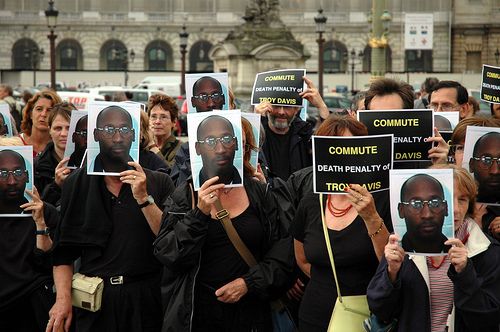Before Troy Davis: A History of Contested Death Penalty Cases

Barring a last-minute reversal, Georgia inmate Troy Davis will face the death penalty tonight (Sept. 21) for the 1989 shooting of a police officer.
Davis' case has received national and international attention because of concerns about witness testimony. Seven of nine eyewitnesses who implicated Davis in the shooting have recanted their testimony, and others say that the man who originally implicated Davis was actually the killer. Public figures as diverse as death penalty opponent former President Jimmy Carter and conservative U.S. representative Bob Barr of Georgia have called for reconsideration of Davis' sentence, but on Sept. 20, the Georgia Board of Pardons and Paroles declined to grant him clemency.
Davis' case has been particularly publicized, but his is not the first death penalty case surrounded by controversy.
"What's happened in the last 10 years in the United States is that there has been a dramatic increase in opposition to the death penalty," said Michael Radelet, a sociologist at the University of Colorado who specializes in death penalty issues. "I think that's part of why Troy Davis is getting attention."
The Davis case is also grabbing headlines, because Davis has "a strong case for innocence," Radelet said.
"I have to admit, this one really stumps me," Radelet said. "It really surprises me. I'm just astonished that they're going to let this execution go forward." [Execution Science: What's the Best Way to Kill a Person?]
Of course, every death penalty case comes wrapped in some degree of debate, given deep disagreement over whether the death penalty is ever moral. Here is a by-no-means-exhaustive list of some of the most controversial cases of the 20th and 21st centuries:
Sign up for the Live Science daily newsletter now
Get the world’s most fascinating discoveries delivered straight to your inbox.
Sacco and Vanzetti: Italian Anarchists (1927)
Death penalty controversy is not a new phenomenon. Italian immigrants Ferdinando Nicola Sacco and Bartolomeo Vanzetti were executed in 1927 after a highly contested series of trials over the shooting death of two men during a 1920 armed robbery. [The History of Human Aggression]
Sacco and Vanzetti were followers of Italian anarchist Luigi Galleani, and anti-Italian sentiment almost certainly played a role in their execution, Radelet said. The accused men waged a then-unprecedented six-year legal battle that went all the way to the Supreme Court twice, and public figures (Albert Einstein among them) called for new trials. But even a confession to the murders by another man, ex-convict Celestino Madeiros, could not save Sacco and Vanzetti's lives. They died in the electric chair on Aug. 23, 1927. Later, several anarchist leaders spoke out to say that Sacco was guilty but Venzetti was not, though historians still debate whether either man really pulled the trigger.
The Scottsboro Boys: Race in Alabama (1931)
Based on the judgment of all-white juries, eight black teenage boys were sentenced to death for the rape of two white women on a freight train in 1931 (a ninth boy, only 12, was judged too young for the electric chair). The trials took place in just a day — with a lynch mob demanding the surrender of the teenagers outside the jail before the trials — and the only lawyers who would defend the accused included a retiree who hadn't tried a case in years and a Tennessee real estate lawyer unfamiliar with Alabama law.
The convictions led to demonstrations in the heavily black neighborhood of Harlem in New York City, and the case eventually made it to the Supreme Court, where the convictions were reversed because of the lack of an adequate defense. Amid enormous public interest, charges were dropped against four of the men. Three were re-sentenced to life in prison; a fourth, Clarence Norris, was re-sentenced to death, later reduced to life in prison. Gov. George Wallace pardoned Norris in 1976. To this day, the Scottsboro case is still shorthand in public dialogue for unfair, racially biased convictions and sentencing.
Bruno Hauptman: The Lindbergh Baby (1932)
The abduction and murder of the 20-month-old son of Charles and Anne Lindbergh was known as "The Crime of the Century" in 1932. Two years later, German immigrant Bruno Hauptmann was arrested after allegedly spending some of the ransom money given by the Lindberghs before they knew that their baby was dead. [Criminal Minds: A Psychiatrist's View from Inside Prison]
The crime of the century led to the trial of the century, with Hauptmann maintaining his innocence to the end. Later analyses would question much of the evidence that sent Hauptmann to his death, including eyewitness accounts and a lack of Hauptmann's fingerprints at the scene. Books have been written both supporting the 1932 verdict and refuting it, and Hauptmann's widow fought until her death in 1994 to have her dead husband's conviction overturned.
Caryl Chessman: Death Penalty Without Murder (1960)
Californian Caryl Chessman became a flashpoint for anti-death-penalty sentiment in the 1950s. Chessman was convicted of robbery, kidnapping and rape in 1948; the jury determined that Chessman had caused bodily harm during one of the kidnappings, making him eligible for death.
From death row, Chessman wrote books maintaining his innocence and insisting that his original confession had been coerced. There was widespread outrage over the case. Among his supporters, Chessman counted former first lady Eleanor Roosevelt, writer Ray Bradbury and poet Robert Frost.
Chessman missed his chance at a stay of execution (his ninth) on May 2, 1960. As the gas chamber at San Quentin Prison filled with toxic fumes, a legal secretary called to say that a federal judge had issued one more stay of execution. But it was too late for Chessman, who gasped a few times and died.
Carlos De Luna: The Wrong Man?
The state of Texas put Carlos De Luna to death in 1989 for the killing of a convenience store clerk in 1983. Until the end, De Luna maintained his innocence; years after his death, in 2006, the Chicago Tribune reported that another man, Carlos Hernandez, had bragged about killing the clerk to friends and family.
"He said he was the one that did it, but that they got somebody else — his stupid tocayo — for that one," Dina Ybanez, an acquaintance of Hernandez, told the Tribune. "Tocayo" means namesake in Spanish.
A detective in Corpus Christi, Texas, where the killings took place, told the Tribune that the investigation surrounding the death was sloppy and that detectives failed to follow up on tips that Hernandez was talking about the killing. The Tribune investigation also turned up questions about whether the killing was really a robbery and about eyewitness identifications of De Luna — though some of De Luna's actions, including lying to police about his whereabouts that night, left some prosecutors still convinced of De Luna's guilt. [History's Most Overlooked Mysteries]
Teresa Lewis: A Woman on Death Row (2010)
The first woman to die by lethal injection in the state of Virginia, Teresa Lewis was convicted of paying to have her husband and stepson murdered in 2002. Her case drew outcry, because testing had pegged Lewis' IQ at 72, just two points above that classified as intellectually disabled. Lewis' attorneys advised her to plead guilty in hopes of leniency, but she instead received the death penalty. The two hitmen who killed her husband and stepson received life sentences.
Her supporters, among them legal novelist John Grisham, sent thousands of appeals for clemency to Virginia Gov. Bob McDonnell, to no avail. Lewis was executed on Sept. 23, 2010.
Humberto Leal: an International Incident (2011)
The controversy around Humberto Leal's death was not focused on his guilt, but on his legal rights. Leal, a Mexican citizen, was convicted of the 1994 rape, kidnapping and murder of 16-year-old Adria Sauceda, whose body was found bludgeoned on a dirt road in San Antonio, Texas. But police had not informed Leal of his right to call the Mexican consulate upon his arrest, putting the case on shaky grounds.
In 2004, the International Court of Justice in The Hague ruled that Leal and other Mexican nationals on death row had been denied their right to contact their consulate under the Vienna Convention. The Supreme Court in 2008 held that the International Court's judgment was binding, but Congress would have to pass a law to ensure individual states would comply. That never happened.
Citing fears that Leal's execution would harm America's standing in the world, the Obama administration entreated the Supreme Court to stay the execution until Congress could pass the binding law. The Supreme Court concluded that Congress had plenty of time to do so, and denied the appeal. Leal died by lethal injection on July 7, 2011.
Duane Buck: Racial Bias? (2011)
In a rare move on Sept. 15, 2011, the Supreme Court halted the execution of Texas death row inmate Duane Buck. The stay was a surprise, because the Supreme Court rarely jumps in on death penalty cases unless there is doubt about the defendant's innocence; in this case, it wasn't Buck's guilt that led the Supreme Court to step in, but the testimony of a psychologist at his sentencing who said that black criminals were more likely to commit violence in the future than criminals of other races. (Buck was convicted of killing his ex-girlfriend and her friend in 1995.)
The psychologist's comment has led to cries of racial bias, and in 2000, then-Texas Attorney General John Cornyn (now a U.S. senator) recommended that six cases in which the psychologist gave the racially tainted testimony be reopened.
All the cases but Buck's were, and all five of those defendants were re-sentenced to death. The Supreme Court will now decide whether to hear Buck's case. If it doesn't, Buck will have to again appeal to Texas' Board of Pardon and Paroles, which has once before refused to commute his sentence to life in prison. If the board again turns down Buck's request, only Texas Gov. Rick Perry could halt Buck's execution.
Cameron Todd Willingham: Innocent of Arson? (2004)
Of the 235 people put to death during the tenure of Texas Gov. Rick Perry, the case of Cameron Todd Willingham might be the most controversial. Willingham was convicted and executed for the deaths of his three young daughters, who died in a fire at the family's home. Prosecutors alleged that Willingham set the fire and killed the girls to cover up abuse; Willingham's wife, who was not home at the time of the blaze, denied at the time that he abused his children.
The crux of Willingham's case, however, revolved around whether the fire was set on purpose at all. Central to Willingham's conviction was an analysis by deputy fire marshal Manuel Vasquez concluding that lighter fluid or some other accelerant had been spread throughout the hallways of the home. But in 2004, a second fire investigator, Gerald Hurst, looked into Willingham's case. Hurst found multiple scientific errors in Vasquez's report and concluded that there was no evidence of arson. A 2009 report by the Texas Forensic Science Commission would later come to the same conclusion.
Despite Hurst's criticisms, both the Texas Board of Pardons and Paroles and Perry declined to halt Willingham's execution. He was put to death in 2004.
But that wasn't the end of the Willingham case: In 2009, the case became intertwined with politics after Perry replaced three members of the Texas Forensic Science Commission two days before a meeting on the report, leading critics to accuse the governor of trying to hush up talk of Willingham's potential innocence. When the commission released its report in April 2011, it took no stance on Willingham's guilt or innocence. [Read: 10 Political Protests That Change the World]
With Perry running for president, the Willingham case may again enter the public consciousness. But an admission of fault is unlikely, UC Boulder's Radelet said. There have only been a handful of post-mortem pardons in the U.S., one in 1891 in Illinois and one in January 2011, when then-Colorado Gov. Bill Ritter pardoned a disabled man executed in 1939, Radelet said. With Presdential politics at play, he said, there is even less motive to look deeply at the Willingham case.
"If Rick Perry ever admitted that Willingham was innocent, his political life would be threatened," Radelet said.
You can follow LiveScience senior writer Stephanie Pappas on Twitter @sipappas. Follow LiveScience for the latest in science news and discoveries on Twitter @livescience and on Facebook.

Stephanie Pappas is a contributing writer for Live Science, covering topics ranging from geoscience to archaeology to the human brain and behavior. She was previously a senior writer for Live Science but is now a freelancer based in Denver, Colorado, and regularly contributes to Scientific American and The Monitor, the monthly magazine of the American Psychological Association. Stephanie received a bachelor's degree in psychology from the University of South Carolina and a graduate certificate in science communication from the University of California, Santa Cruz.











